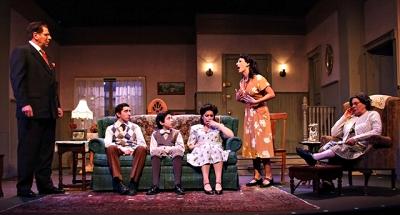‘Lost in Yonkers,’ Neil Simon’s Best Play, Done Justice in Quogue

There was a time in the 1970s when a New York theater critic began referring derisively to the playwright Neil Simon as “Simple Simon.” The reference was to Mr. Simon’s penchant for writing light, funny‚ and perhaps superficial plays such as “The Odd Couple,” “Barefoot in the Park,” and “The Sunshine Boys.”
Then in the 1980s Mr. Simon began a series of autobiographical works known as the “B” plays: “Brighton Beach Memoirs,” “Biloxi Blues,” and “Broadway Bound.” While they were still essentially comedic, these plays were also studded with moments of pain that alluded, directly or indirectly, to Mr. Simon’s difficult Depression-era childhood, and they began to earn the playwright the critical respect that had previously eluded him. This new cycle of works culminated in 1991 with “Lost in Yonkers,” which earned Mr. Simon the Pulitzer Prize. By this time “Simple Simon” had been long forgotten.
“Lost in Yonkers” is considered Neil Simon’s best work for good reason: It is a serious family drama that carries echoes of classics of the American stage, such as Tennessee Williams’s “The Glass Menagerie,” while still displaying Mr. Simon’s unfailing gift for humor. A very solid and crowd-pleasing version of the play is currently running at the Hampton Theatre Company in Quogue through Sunday.
The setting is Yonkers, N.Y., a short time after the attack on Pearl Harbor. Eddie Kurnitz has just lost his wife to cancer and must leave home to sell scrap metal to the Army in order to pay for medical bills he has incurred during her hospital stay. The problem is what to do with his two teenage sons, Jay, 15, and Arty, 13. With nowhere left to turn, Eddie appeals to his mother for help.
Grandma Kurnitz, who survived persecution in Berlin before the war, doesn’t want the boys. She has her own hands full with her daughter, Bella, a daffy, child-like spinster who lives at home. Nevertheless, for the sake of family and dramatic effect, the boys end up at Grandma’s.
This is not, however, the jolly grandma of apple pie and card games. Played with steely bitterness by Diana Marbury (she also provided the convincing set decor), Grandma Kurnitz tries to turn her misery on anyone in her path (“Everybody in Yonkers is afraid of Grandma!” says Jay). And with the arrival of the mischievous boys, the playwright has a perfect set of foils, though this odd couple plays for higher dramatic stakes.
The performances are solid all around, especially the infectiously charming James Baio as Jay and Christopher Darrin as Arty. Edward Kassar has a nice turn as Louie, Eddie’s loveable tough-guy brother; he especially shines in the play’s climactic set piece where he is urged by Bella to sit down for her big announcement (she’s getting married), while at the same time watching out the window for the gangsters who are pursuing him.
But it is Bella who must carry the play, and Rebecca Edanas terrific in the role. Like Tom in “The Glass Menagerie,” Bella is a woman saddled with an infirm family member who has stunted her entry into the world, and Ms. Edana manages to bring heart-tugging empathy to the character. It’s a lot to ask of an actor to embody a character who’s both slow-witted and emotionally lucid — it’s what no less an actor than Tom Hanks managed to pull off in Forrest Gump. And when Ms. Edana delivers this play’s version of the “I know what love is” speech to Grandma Kurnitz, it leaves a mark.
The play is well directed by George A. Loizides, though there were times when the actors’ projection seemed a bit hushed (this could also be a kink in the theater’s acoustics). The crowd at the Hampton Theatre Company leans toward the senior circuit, and there were some rumblings at intermission regarding volume level.
All told, though, this is a highly enjoyable night of theatre. Mr. Simon’s “Lost in Yonkers” may not quite stack up with the heavyweight family stage epics of Eugene O’Neill and Arthur Miller, but its balance of humor and drama is deeply satisfying. This Hampton Theatre Company version does it justice.
